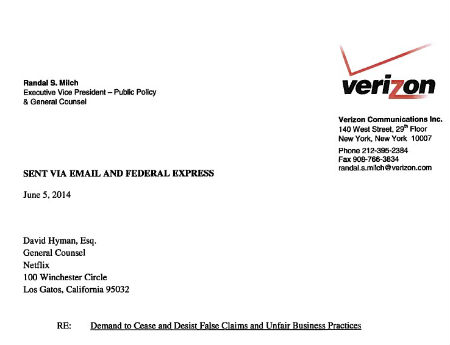Verizon Threatens Netflix With Legal Action
The smarter way to stay on top of the multichannel video marketplace. Sign up below.
You are now subscribed
Your newsletter sign-up was successful

After calling Netflix’s use of an on-screen message that blames ISPs for slow video streams a “PR stunt,” Verizon Communications has taken it up a notch by threatening Netflix with legal action if the video streaming giant keeps on doing it.
Verizon sent Netflix a letter Thursday demanding that the online streaming giant cease and desist what it claims to be unfair business practices that threaten its broadband business.
The letter comes soon after Yuri Victor of Vox Media tweeted a screenshot of a Netflix browser message that read: “The Verizon network is crowded right now. Adjusting video for smoother playback…” Netflix chief communications officer Jonathan Friedland later noted in a tweet that the OTT video provider is “always testing new ways to keep members informed, and told Re/code that the new tactic is ISP agnostic, and not directed only at Verizon, calling it a “test that advises members when their network is congested…We’ll see whether they think it is valuable or not.”
Randal S. Milch, EVP-public policy & general counsel for Verizon, in the cease and desist letter addressed to Netflix general counsel David Hyman, claimed: “There is no basis for Netflix to assert that issues with respect to playback of any particular video session are attributable solely to the Verizon network. As Netflix knows, there are many different factors that can affect traffic on the Internet, including choices by Netflix in how to connect to its customers and deliver content to them, interconnection between multiple networks, and consumer-in-home issues such as in-home wiring, WiFi, and device settings and capabilities.”
Milch likewise blamed Netflix for electing to send its traffic over congested routes, labeling its accusations on last-mile ISPs for being solely responsible for service issues as “self-serving, deceptive, inaccurate and an unfair business practice.”
The Verizon exec also claimed that “Netflix’s false accusations have the potential to harm the Verizon brand in the marketplace…The impression that Netflix is falsely giving our customers is that the Verizon network is generally “crowded” and troublesome. This could cause a customer to think that any attempted viewing of video, whether it be from Hulu, YouTube or other sites, would yield a similarly “crowded” experience and he or she may then choose to alter or cease their use of the Verizon network.”
In addition to demanding that Netflix stop posting similar notices to users on the Verizon network, the telco also demanded that Netflix, within five days, provide Verizon with “any and all evidence and documentation that it possesses substantiating Netflix’s assertion to Mr. Yuri Victor that his experience in viewing a Netflix video was solely attributable to the Verizon network.”
The smarter way to stay on top of the multichannel video marketplace. Sign up below.
Verizon, he added, could “pursue legal remedies” if Netflix fails to provide this information.
Milch also questioned Netflix’s behavior in the wake of a paid interconnection between the two companies announced in April. “I sincerely hope this is not a harbinger of things to come in terms of now Netflix treats its network partners and our mutual customers,” Milch wrote.
Update: Netflix issued this statement in response to the cease-and-desist letter: "This is about consumers not getting what they paid for from their broadband provider. We are trying to provide more transparency, just like we do with the Netflix ISP Speed Index, and Verizon is trying to shut down that discussion."
Netflix has said it reluctantly agreed to deals with Verizon and Comcast in order to ensure the quality of its streaming service while complaining that they are tantamount to an “arbitrary tax” on Netflix and other OTT services. Netflix’s actions also come as the company urges the FCC to pursue “stronger” network neutrality rules and to include paid peering agreements into the scope of the rule-makings discussions.
Dan Rayburn, EVP for StreamingMedia.com and a principal analyst at Frost & Sullivan, shed more light on Netflix’s methodology for this recently introduced tactic Wednesday in this blog post, noting that Netflix told him that it’s rolling it out in phases, and will display the messages whether or not they have a paid or free direct connection with the ISP.
Netflix told Rayburn that messages will be sent to subscribers when they are streaming from an ISP/designated market area pair where:
- The average bitrate is poor (SD)
- There is high congestion (the ratio between peak and trough traffic is abnormally compressed)
- Netflix sees a high percentage of sessions with a rebuffer, then the player displays the warning during the initial buffering at play start
But he added that Netflix may modify its criteria for when it sends the on-screen indicator as it expands the rollout and learns more.
